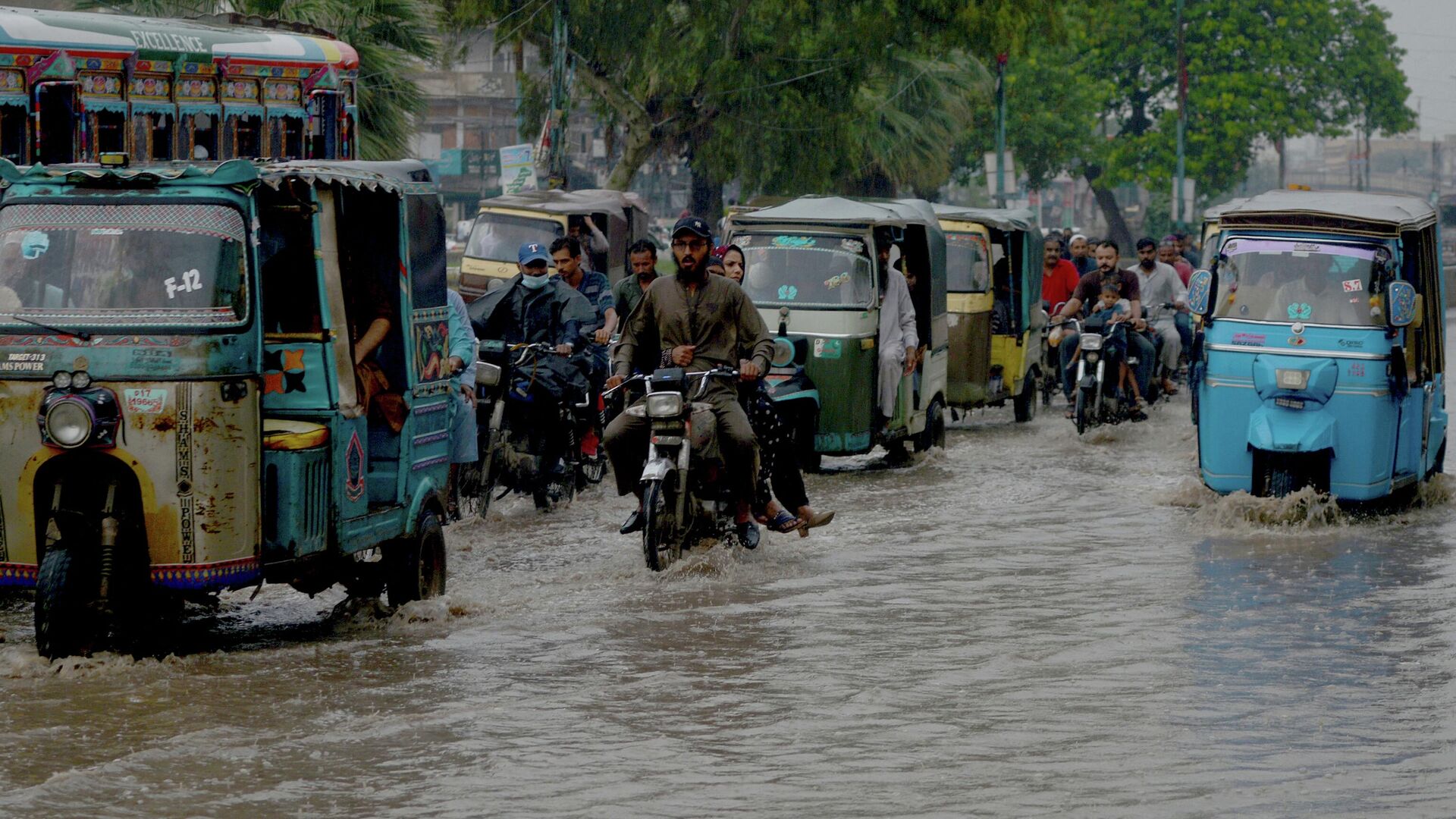https://sputnikglobe.com/20220918/waves-of-death-who-warns-of-second-deadly-disaster-in-pakistan-after-floods--1100923408.html
'Waves of Death': WHO Warns of Second Deadly Disaster in Pakistan After Floods
'Waves of Death': WHO Warns of Second Deadly Disaster in Pakistan After Floods
Sputnik International
The unprecedented floods in Pakistan in August-September have covered one-third of the country in water, claiming over 1,500 lives and displacing more than 30... 18.09.2022, Sputnik International
2022-09-18T11:54+0000
2022-09-18T11:54+0000
2023-02-14T08:51+0000
india
pakistan
floods
flash floods
floodwater
world health organization (who)
https://cdn1.img.sputnikglobe.com/img/07e6/09/12/1100924729_0:0:3072:1728_1920x0_80_0_0_2ba00c749aea68e101ce9ddb327060dc.jpg
The World Health Organization (WHO) has warned of a “second disaster” of disease and death in Pakistan as the flood water has started receding from streets and residential areas in the country.The WHO chief said that as the water supply in the country remains disrupted, people are now forced to drink unsafe water, which can spread water-borne diseases like cholera and diarrhoea.He also said that flood water, which entered residential areas, is now stagnant and “serving as a breeding ground for mosquitoes and spreading vector-borne diseases such as malaria and dengue.”Meanwhile, the WHO provided water purification kits and oral rehydration salts to prevent diarrheal diseases. The health organization also released a fund of $10 million to provide essential medicine and other supplies. Meanwhile, a total of 2.5 million patients had been treated at different medical camps across Sindh province from July to date (September 18), which is also the most affected area due to flood, Dawn.com reported citing Sindh Directorate General Health Services.
pakistan
Sputnik International
feedback@sputniknews.com
+74956456601
MIA „Rossiya Segodnya“
2022
Deexa Khanduri
https://cdn1.img.sputnikglobe.com/img/07e4/0c/1e/1081607388_0:0:961:960_100x100_80_0_0_e9e931b8c1e18fb41f3074e2145d7a3a.jpg
Deexa Khanduri
https://cdn1.img.sputnikglobe.com/img/07e4/0c/1e/1081607388_0:0:961:960_100x100_80_0_0_e9e931b8c1e18fb41f3074e2145d7a3a.jpg
News
en_EN
Sputnik International
feedback@sputniknews.com
+74956456601
MIA „Rossiya Segodnya“
Sputnik International
feedback@sputniknews.com
+74956456601
MIA „Rossiya Segodnya“
Deexa Khanduri
https://cdn1.img.sputnikglobe.com/img/07e4/0c/1e/1081607388_0:0:961:960_100x100_80_0_0_e9e931b8c1e18fb41f3074e2145d7a3a.jpg
india, pakistan, floods, flash floods, floodwater, world health organization (who)
india, pakistan, floods, flash floods, floodwater, world health organization (who)
'Waves of Death': WHO Warns of Second Deadly Disaster in Pakistan After Floods
11:54 GMT 18.09.2022 (Updated: 08:51 GMT 14.02.2023) Deexa Khanduri
Sputnik correspondent
The unprecedented floods in Pakistan in August-September have covered one-third of the country in water, claiming over 1,500 lives and displacing more than 30 million people. Pakistan's government estimates that the recent flood causes economic losses totaling around $30 billion.
The World Health Organization (WHO) has warned of a “second disaster” of disease and death in Pakistan as the
flood water has started receding from streets and residential areas in the country.
The WHO chief said that as the water supply in the country remains disrupted, people are now forced to drink unsafe water, which can spread
water-borne diseases like cholera and diarrhoea.
He also said that flood water, which entered residential areas, is now stagnant and “serving as a breeding ground for mosquitoes and spreading vector-borne diseases such as malaria and dengue.”
Meanwhile, the WHO provided water purification kits and oral rehydration salts to prevent diarrheal diseases. The health organization also released a fund of $10 million to provide essential medicine and other supplies.
“Health workers in Pakistan are stretched to the limit as they do all they can to deliver critical services amid the destruction. Nearly 2,000 health facilities have been fully or partially damaged,” Tedros said.
Meanwhile, a total of 2.5 million patients had been treated at different medical camps across Sindh province from July to date (September 18), which is also the most affected area due to flood,
Dawn.com reported citing Sindh Directorate General Health Services.


